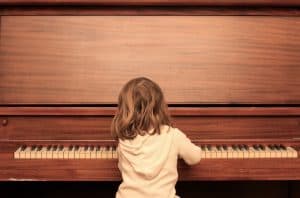Learning to play piano is not just a way to keep kids occupied after school or during school breaks. Piano lessons for kids are extremely beneficial for your child’s development. Sitting down with your child at the piano is also a fantastic bonding activity.
Piano learning can also be a lot of fun! We’d like to share with you some information that we hope you’ll find helpful when guiding your kids in their music journey.
Understanding why music education matters in child development
Music training, such as learning how to play the piano, has been found to have positive effects on an individual. The many benefits of playing piano include increased motor control, better memory and listening skills, greater emotional intelligence and enhanced well-being.
Scientists at the University of Southern California (USC) have also found that children’s brains develop faster with music training. The researchers examined the effect of music education on the cognitive, social and emotional development of children.
According to the initial results of the five-year study, the auditory systems of children in a music program were maturing faster, or were more fine-tuned than those of kids who did not receive any music training. This means that musically trained children are more efficient at processing sound.
How is this important to a child’s overall development?
“The auditory system is stimulated by music”
says the study’s lead author, Assal Habibi. This system is responsible for sound processing in general. The ability to process sound accurately is important in three major skills: language, reading and communication.
The study shows further evidence that children who receive music instruction, such as piano lessons, are able to develop these fundamental skills at a faster rate than children of the same age who are not exposed to any music training.
It works the other way around, too. Dr. Kyle Pruett, who teaches child psychiatry at the Yale School of Medicine, says:
“The development of language over time tends to enhance parts of the brain that help process music.”
We can see there is a clear relationship between music and language – the more children learn music, the more they become verbally competent. And the more their language skills develop, the better they become at processing sound, a necessary skill for musicians.
But that’s not all. Studies have also shown that music education also improves children’s spatial-temporal skills. These skills are important when it comes to solving problems that involve multiple steps. Children who learn music are able to visualize different elements that should go together, allowing them to solve puzzles more easily. That’s a plus for any growing child!
Learn more about the many benefits of music education.
1) Preparing kids for piano lessons
How do parents prepare their children for their first piano lessons? Skoove provides some great beginning courses that slowly walk you through the basics of playing the piano and can easily be followed by a young child.
Here are some great ideas to encourage children to love and appreciate music.
👂 Listen to music together
You have a wide range to choose from, from the works of classic composers such as Beethoven and Mozart to the popular tunes of Queen and the Beatles. Skoove has a great intro to “Help” and a few other Beatles tracks to help you get started. By introducing your children to a variety of harmonies and melodies, it helps them discover the sounds they like and prepares them to learn about different musical concepts.
You can even spice up your listening sessions with some dancing! Moving to the music can help children develop a sense of rhythm, which is important when learning to play piano. Slow or fast, classical or pop – feel the music and move your bodies along!
🎼 Do music-related activities
There are tons of fun activities you can do with your children that can help them develop a lifelong appreciation for music. You can sing nursery rhymes or have a family sing-off to see who can come up with the silliest ditty.
You can also make your own musical instruments, like a shaker made using a plastic egg and some (uncooked) rice, or a set of drums made from plastic containers. “Guess My Song” is another fun activity where you take turns humming the melody and guessing the title of the tune
🎫 Attend live music performances
There’s nothing like being able to see a musician perform live to really inspire you to play an instrument yourself. Taking your children to watch live music performances can help them visualize themselves doing the playing. Quick tip: Check out the events calendar in your town or city for free concerts and recitals.
🎹 Play around the piano
Of course, if your children are going to be learning how to play the piano, they need to be familiar with it. If it’s something they already see and hear every day, then it’s time to let them try it out themselves.
If having a piano around is completely new to them, let them tinker with the keys so they become comfortable. Remember to guide your children with gentle supervision as they get acquainted with the instrument they would be spending a lot of time with. Encourage them to discover different notes and allow them to explore their musical creativity! You might want to review some of our lessons on practicing tips to get the idea. Skoove gives you the lowdown on hand positioning and coordination to make sure you’re on the right track.

2) Making piano lessons and practice sessions more enjoyable for kids
Whether your child is learning piano at school, in a group class, with a private instructor or online, you can help make piano learning easier and more fun.
🕰 Use a metronome
A metronome is a valuable tool for anyone learning to play a musical instrument. It shows a steady beat or pulse, helping learners keep time when playing. The tempo can be sped up or slowed down. Metronomes are ideal to use when first learning a song and improving a sense of rhythm. A metronome can take the form of a physical device or an app.
Read more about the importance of practicing piano with a metronome.
📱 Supplement lessons with a piano app
Kids in today’s tech-driven world take to apps like fish take to water. Learning with a piano app can motivate them to practice their lessons and even advance to the next. What’s great about a piano learning app is your child can practice anytime, for as long as they want.
Skoove is an app that offers hundreds of piano lessons for players of all skill levels. While it’s best suited for teens and adults, younger kids can also learn piano using it (with adult guidance, of course).
One of the things we love about Skoove is that it gives instant feedback on a player’s accuracy with notes and rhythms. It’s just like having a piano teacher with you but without the risk of embarrassment when you make a mistake.
By practicing with Skoove, children may develop a deeper understanding of musical concepts and build more confidence in their piano playing. They can learn at their own pace too.
Lessons on Skoove use a method called “Listen, Learn, Play,” which helps beginners train their ear and develop their sight reading skills. Children learning to play piano can also go back to review a lesson anytime.
🕹 Integrate games into practice sessions
If practice sessions feel more like playtime than a serious and repetitive activity, kids would surely look forward to practicing piano every day. Check out these piano practice games you can play with your child.
3) Motivating kids to keep going
No matter how fun an activity can be, kids may sometimes lose interest or get distracted. Learning to play piano is no different. Even the most passionate of players can at times feel their motivation decrease, especially when they think they’re not making progress. The ups and downs are all part of the musical journey. Good thing you’re there to support your child all the way!
It’s important to note that when learning a musical instrument, taking breaks is as necessary as practice. If you observe that your child doesn’t seem to have the same pep to practice as before, let them take a breather. Do other music-related activities with them to preserve and renew their interest.
It would also be good to have a tool like Skoove so your child can easily pick up where they left off when they’re ready to get back on track.
If you feel like your child needs a little nudge, here’s how you can encourage them to keep going.
🎶 Let them play songs they like
One way to encourage kids (and adults too!) to keep learning piano is by letting them play the songs they actually like, or songs that are familiar and meaningful to them. If a certain song is close to your heart, you feel more connected with it and are more likely to express yourself through it.
If your child is a fan of a particular artist, then they can find that artist on Skoove’s platform by searching through all the songs and then start practicing playing the notes for one of their songs. A great example would be “We Will Rock You” by Queen which is currently available on the Skoove platform and has a great step by step guide making it easy to pick up and play for a beginner.
📈 Track their progress
Seeing how much they’ve improved is a great motivator for children learning piano. Tracking your child’s progress is easy enough on a piano learning app like Skoove because you only need to take a look at all the lessons you’ve covered. Being able to go from Piano Beginner 1 to Piano Beginner 2 is already a major achievement, something that will surely put a smile on your child’s face and make them look forward to Piano Beginner 3.
Another way to motivate your child through progress-tracking is by making videos they can watch at the end of the week or after a series of lessons. Record short video clips of your child playing during every session and then join these clips together.
If your child feels a bit down, show them the videos you’ve made and offer encouraging words, like “You’re doing a great job! See how much better you’ve become at playing this piece?”
💪 Be an example
Another way to encourage kids to learn piano is to show them they’re not alone. Why not learn piano yourself? Show them it’s okay to make mistakes, that it’s alright to just chuckle it off and try again. It’s really never too late to learn piano. Not only will it help you bond with your kids, it’s also a fantastic way to de-stress while learning something new!
You and your child can take turns learning piano through Skoove lessons that are tailored according to your individual skill levels. You can also play together and practice your left hand-right hand dexterity, or simply for fun. Stage a small concert at home and invite your friends to attend – this will further motivate you and your child to practice. Then, give yourselves a pat on the back (or a huge tub of ice cream) for a job well done!
 Summary
Summary
Learning to play piano offers a multitude of benefits for children. Piano lessons for kids and other forms of music training have a positive effect on children’s development. Making the most of music education involves preparation, support and encouragement. We hope you find these tips useful in guiding your child in their musical discovery journey.
Author of this blog post:

Jennifer is a staff writer at Know Your Instrument and writes regularly about the music industry. When not writing about music, Jennifer enjoys hanging out with friends and grabbing a coffee as well as walking her dog, Jack.
